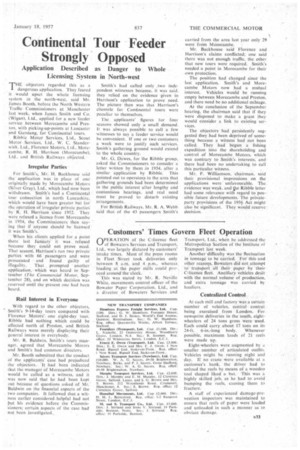Continental Tour Feeder Strongly Opposed
Page 65

If you've noticed an error in this article please click here to report it so we can fix it.
Application Described as Danger to Whole Licensing System in North-west
THE objectors regarded this as a dangerous application. They feared it would upset the whole licensing system in the north-west, said Mr. James Booth. before the North Western Traffic Commissioners at Manchester last week. when James Smith and Co. (Wigant. Ltd., applied for a new feeder service between Morecambe and Preston, with picking-up-points at Lancaster and Garstang, for Continental tours.
Ribble Motor Services, Ltd— Scout Motor Services, Ltd.. W. C. Standerwick. Ltd., Florence Motors, Ltd.. Morecambe, R. H. Harrison (Morecambe), Ltd.. and British Railways objected.
Irregular Parties For Smith's, Mr. H. Backhouse said the application was in place of one originally made by Morecambe Motors (Silver Gray), Ltd., which had now been withdrawn. Smith's had a Continental lour connection in north Lancashire, which would have been greater but for the operation of irregular private parties by R. H. Harrison since 1952. They were refused a licence from Morecambe in 1954, the Commissioners then saying that if anyone should be licensed it was Smith's.
When his clients applied for a point there last January' it was refused because they could not prove need. That season', Harrison's ran two private parties with 66 passengers and were prosecuted and found guilty of illegality. That prompted another application, which was heard in September (The Commercial Motor, September 28), and on which decision was reserved until the present one had been heard.
Rail Interest in Everyone
With regard to the other objectors, Smith's 9-14-day tours compared with Florence Motors', one eight-day tour. Ribble had nothing which could be affected north of Preston, and British Railways were merely displaying their general interest in everybody.
Mr. R. Baldwin. Smith's tours manager. agreed that Morecambe Motors and Smith's had common directors.
Mr. Booth submitted that the conduct of the applicants' case had prejudiced the objectors. -It had been indicated that the manager of Morecambe Motors would be called as a witness, and it was now said that he had been kept out because of questions asked of Mr.' Baldwin on the financial aspects of the two companies. It followed that a witness earlier considered helpful had not Out his evidence before the Commissioners; certain aspects cff the case had not been investigated..
Smith's had called only two independent witnesses because, it was said. they relied on the evidence given in Harrison's application to prove need. The picture then was that Harrison's clientele for Continental tours were peculiar to themselves.
The applicants' figures tor four seasons showed only a small demand. It was always possible to call a few witnesses to say a feeder service would he convenient. If one or two customers a week were to justify such services. Smith's gathering ground would extend to the whole country.
Mr. G. Dawes, for the Ribble group, asked the Commissioners to consider a letter written by them .in 1954, after a similar application by Ribble. This pointed out to operators in the area that gathering grounds had been determined in the public interest after lengthy and contentious hearings, and real need must be proved to disturb existing arrangements.
For British Railways. Mr. R. A. Webb said that of the 43 passengers Smith's carried from the area last year only 29 were from Morecambe.
Mr. Backhouse said Florence and Harrison's claims conflicted; one said there was not enough traffic, the other that new tours were required. Smith's needed a point in Morecambe for their own protection.
The position had changed since the last application. Smith's and Morecambe Motors now had a mutual interest. Vehicles would be running empty between Morecambe and Preston, and there need be no additional mileage.
At the conclusion of the September hearing, the chairman said that if they were disposed to make a grant they would consider a link to existing services.
The objectors had persistently suggested they had been deprived of something because a witness had not been called. They had begun a fishing expedition into the shareholding and control of Morecambe Motors, which was contrary to Smith's interests, and there had been no undertaking to call this particular witness.
Mr. F. Williamson, chairman, said their provisional impressions on the applications were unfavourable. The evidence was weak. and Vie Ribble letter had some relevance with regard to possible future developments. The privateparty provisions of the 1956 Act might also be significant. They would reserve decision.








































































































